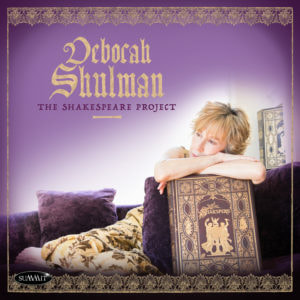
She brings along musicians who provide the rub for such tempestuous material—a veritable who’s who of my favorites: the amazing Abraham Laboriel on bass for five of the 12 tracks, the meteoric Larry Koonse on guitar for seven tracks, the splendid Bob Sheppard on woodwinds for four, and Jeff Colella himself on piano. Plus, there are added artists who make for an astounding ensemble of the right musicians for the right music.
William Shakespeare in the great wordsmith of the English language. His words are musical in any delivery. Add wondrous music to those words and the heart melts. Add the right voice to sing those lyrics…now you’ve got something amazing. Deborah Shulman is that voice.
The album opens with an appropriate medley of All the World’s a Stage (from As You Like It)/If Music Be the Food of Love (from Twelfth Night). This John Duckworth composition is a nice launch into a staging of great music. The heavy-hitters come out to play right away with Colella, Koonse, Laboriel, Sheppard (flute and clarinet), and Joe La Barbera on drums.
All the World’s a Stage is a sweet rhapsody featuring piano, bass, and flute and sets up the cheerful and up-tempo If Music Be the Food of Love with the jumping piano, guitar, and flute. Deborah is clear and direct in her delivery of the lyrics. With her background in theatre, she handles the lines effortlessly but gives them her own distinctive stamp.
The song fades away with that dreamy guitar and flute that creates a languid sense of satisfaction. Nicely done.
Blow, Blow Thou Winter Wind (from As You Like It) is by Arthur Young and features Koonse and Colella with Chris Colangelo on bass and Kendall Kay on drums. It is a vibrant and determined stand against what befalls life. Winter winds, feigned friendships, the folly of some love, can be overcome by merriment or (as Camus would have it) by scorn. Deborah beautifully delivers the punch and power.
That is also a fitting set-up for the blues from Macbeth, Dunsinane Blues. Another Dankworth piece, it is Macbeth’s arrogant declaration that he feared no prophecy, no fate, “’Till Burnham Wood be come to Dunsinane.” It’s well-set within a blues because what Macbeth did not know was that his enemies were cutting the branches from the trees of Burnham Wood and using them as cover to approach Macbeth’s fortress on Dunsinane Hill.
Colella, Colangelo and Kay are the trio that provide the base for Deborah’s sardonic declaration of fearlessness. Seriously, Deborah could not have delivered this any better. The irony is made more bitter by her sweet intonation.
Shakespeare’s Sonnet 18 is the source for Shall I Compare Thee to a Summer’s Day by Jeff Colella. This is a warm and delightful duo of Colella’s piano and Koonse’s guitar with Deborah’s rich, lush lyricism. The sheer beauty of the music with those ageless lyrics make for a work that should become a standard.
Who is Sylvia is Dankworth’s song from Two Gentlemen of Verona. Deborah is accompanied only by Abraham Laboriel’s bass. At 1:55, it is the shortest piece on the album but deserves hearing over and over. A sweet ode to a loyal woman who suffers crass disloyalty from the man she loves. The bass seems a bit threatening, like Proteus threatens Sylvia, but Deborah gives us a Sylvia who is worthy that “To her let us garlands bring.”
You Spotted Snakes (from A Midsummer Night’s Dream) is also from John Dankworth and has exquisite guitar work from Larry Koonse and even the appearance of Bob Sheppard’s bass clarinet along with the soprano sax. It is a delightful fancy, as is the play itself. Deborah must know this play intimately, her presentation of the lyrics and especially the mood are that good.
Sonnet 30 is the origin of When to the Sessions of Sweet Silent Thought, a Jeff Colella original. The music is as wonderful as the sonnet itself.
The sad account of fore bemoaned moan
Which I new pay as if not paid before
But if the while I think on thee, dear friend,
All losses are restor’d, and sorrows end
How could you find better lyrics than that? And Deborah gives the legato interpretation in such an agonizing way. Sweet melancholy.
From Much Ado about Nothing comes Sigh No More Ladies by Arthur Young. With Colella, Koonse, Laboriel, and La Barbera is Rob McChesney on trombone. Very upbeat and cheerful.
Another selection from Twelfth Night is Oh Mistress Mine also from Arthur Young. McChesney returns on trombone and given great space. Deborah can effortlessly move from blues to ballad to bop and she does it all so effectively.
My Love is as a Fever (Sonnet 147) and Take All My Loves (Sonnet 40) are both by Duke Ellington and Billy Strayhorn. The difference between the songs is as clear as possible how proficient and flexible that team was. It is also a great testament to the skill and talent of Deborah Shulman and her transcendence of form and style.
The album closes beautifully and (again) fittingly with Our Revels Now Are Ended (from The Tempest), another John Dankworth piece.
And, like this insubstantial pageant faded,
Leave not a rack behind:
We are such stuff
As dreams are made of
And our little life is rounded with a sleep.
This is how to end an album. Even to look at the album’s cover is something meaningful. Deborah is semi-reclined on a couch with her arms folded atop a massive volume of Shakespeare. There is comfort and ease in her relationship with the words of the great man. And this is what she brings to her audience, too—an understanding and a comfort with words that were once daunting to some but, under Deborah’s gentle delivery, those words are now dear friends.
Shakespeare, Jazz, Deborah Shulman. It doesn’t get better than this.
~Travis Rogers, Jr. is The Jazz Owl
 RSS Feed
RSS Feed
